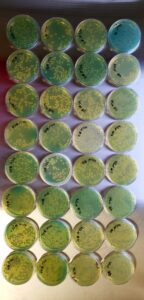
Historically, beer has always been considered a safe drink compared to water, in that pathogens were not found in beer. Due to its low pH value, its high CO2 and alcohol content, and the hop bittering compounds it contains, beer generally does not provide good living conditions for microorganisms. Nevertheless, some beer spoilage yeast and bacteria have adapted in a way that allows them to grow undisturbed even under these conditions. In most cases, these microorganisms do not pose a health hazard to humans but can cause off-flavors, as well as unwanted haziness or turbidity. If contamination is suspected or has already occurred, the entire process chain needs to be investigated as quickly as possible. The analysis process can be extremely time-consuming and can even lead to a production stop, which is why we have invested in technologies that help get you answers as quickly as possible. With our Real Time Polymerase Chain Reaction (PCR) assays, we can identify key spoilage organisms in as little as two days.
Brewing and Distilling Analytics Services (BDAS) knows that the most common beer spoilage microorganisms account for 75% of consumer complaints. Most spoilage incidents are caused by the bacteria Lactobacillus brevis (L. brevis), Lactobacillus lindneri (L. lindneri) and Pediococcus damnosus (P. damnosus), and by the yeast Saccharomyces cerevisiae variant diastaticus. Spoilage can have a big impact on your bottom line, and with our quality monitoring services, we help breweries of all sizes and needs identify what is causing the problem and find ways to get rid of it!
A few notable groups of microorganisms becoming more common in breweries are Zymomonas, Pectinatus, and Megasphaera. These gram-negative bacteria can interfere with the brewing process by producing undesirable off-flavors, especially sewer-like aromas. Other microorganisms ranging from bacteria and yeasts to molds and spore forming rods can also contaminate the brewing process and cause quality issues. The brewers must work diligently to prevent most undesirable organisms from entering the brewing process through equipment, ingredients, or the environment.
As brewing becomes increasingly competitive, with consumers demanding higher quality beers, and retailers looking for products with greater assurance of shelf-lives, this sector of the beverage industry is moving at a faster pace than ever. The biggest threat to beer quality is microbial spoilage. If beer is to survive for more than a few days or weeks once packaged, then attention must be paid to controlling unwanted microbial contamination. It’s important that the risk of beer spoilage is minimized. Modern brewers are increasingly focused on quality assurance by actively integrating process innovations and good manufacturing practices to maximize productivity and the quality of the beer.
Get more information about the analysis of beer spoilage microorganisms at Brewing and Distilling Analytical Services (BDAS). Contact us in Lexington, Kentucky at (859) 278-2533 or in Denver, Colorado at (720) 450-7066.